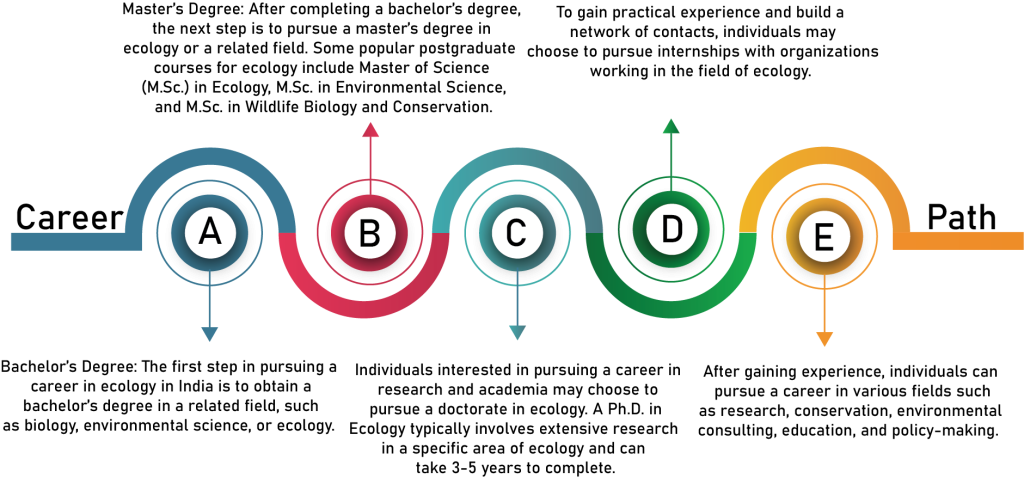Ecology is a multidisciplinary field of study that involves the investigation of the interactions between living organisms and their environment. It focuses on the relationship between organisms and their environment and how they impact each other. As an ecologist, individuals can make a positive impact on the environment by conducting research, developing sustainable practices, and promoting conservation efforts. With a diverse range of career paths and specializations available, pursuing a career in ecology can be both rewarding and challenging.

Work description
The work description of an ecologist can vary depending on the type of organization they work for, but in general, ecologists study the relationships between living organisms and their environment. Here are some common job responsibilities of an ecologist:
- Conducting fieldwork: Ecologists collects data on ecosystems, species, and environmental conditions. This may involve sampling plants and animals, taking measurements of environmental factors such as temperature and rainfall, and conducting experiments to test hypotheses.
- Analyzing data: After collecting data, ecologists analyze it using statistical and computational tools to identify patterns and relationships.
- Writing reports and scientific papers: Ecologists communicate their findings through reports, scientific papers, and presentations.
- Developing conservation plans: Ecologists may work for government agencies, non-profit organizations, or private companies to develop conservation plans to protect endangered species or ecosystems.
High Demand
The opportunity to make a positive impact on the environment and address global issues such as climate change, pollution, and biodiversity loss.
Lucrative salaries
The chance to work outdoors and engage with nature.
Opportunities for innovation
A diverse range of career paths, including research, conservation, environmental consulting, education, and policy-making.
Versatility
The ability to work with and learn from other professionals in related fields, such as biology, geology, and geography.
Flexibility
Opportunities for international travel and collaboration with colleagues from around the world.
Job satisfaction
High job satisfaction and a sense of purpose in contributing to a greater cause.
High stress
Limited job prospects and relatively low salaries compared to other fields.
Long hours
The potential for long hours and physically demanding work, particularly for field-based positions.
Competitive field
The need to continually adapt to changing technologies and research methods.
Constant learning
Competition for funding and resources can be fierce, particularly in academia and research.
Isolation
The emotional toll of working in a field where environmental problems can be overwhelming and difficult to solve.
The amount of money needed to pursue a career in ecology in India can vary depending on various factors such as the level of education, the institution, the location, and the type of program. Here are some estimated costs:
Bachelor’s Degree: The cost of a Bachelor’s degree in ecology can range from INR 50,000 to INR 3,00,000 per year, depending on the college or university.
Master’s Degree: The cost of a Master’s degree in ecology can range from INR 50,000 to INR 5,00,000 per year, depending on the college or university.
PhD: The cost of a PhD in ecology can range from INR 30,000 to INR 3,00,000 per year, depending on the college or university.
Apart from the tuition fees, you also need to consider additional expenses such as accommodation, food, transport, and study materials. These costs can vary depending on your location and lifestyle.
[wpcharts type=”horizontalbarchart” bgcolor=”red:gray:yellow,blue:gray:yellow,random:gray:yellow,purple:gray:yellow” min=”0″ legend=”true” titles=”2 year , 5 year” values=”3,7,5,12″]
The earning potential of an ecologist in India can vary widely depending on their level of education, experience, and the sector they work in.
Entry-level positions in government agencies, non-governmental organizations (NGOs), and research institutions may start at around INR 20,000 to INR 40,000 per month.
With experience, an ecologist can earn up to INR 1,00,000 or more per month, particularly if they work in a senior or leadership role.
Ecologists working in private consulting firms may also earn higher salaries, with senior-level positions commanding salaries of INR 2,00,000 or more per month.
It’s worth noting that the salary levels in ecology may not be as high as in some other industries, but the work can be personally fulfilling and ecologists can make significant contributions to conservation efforts and environmental protection in India.
[wpcharts type=”horizontalbarchart” bgcolor=”red:gray:yellow,blue:gray:yellow,random:gray:yellow,purple:gray:yellow” min=”0″ legend=”false” titles=”Entry-Level, Mid-Career, Senior-Level ” values=”5,15,25,35,45,55″]
Strong interest in the natural world and environmental issues.
Critical thinking and analytical skills to understand complex ecological systems and problems.
Ability to design and conduct experiments and analyze data using statistical software.
Excellent written and oral communication skills.
Strong fieldwork skills and physical stamina to conduct research in various environments and weather conditions.
Ability to work independently as well as collaboratively with other.
Willingness to continuously learn and keep up-to-date with new research and technological advancements in the field.
Lack of interest or passion for the natural world and environmental issues.
Inability to think critically and analyze complex ecological systems and problems.
Limited ability to design and conduct experiments, collect and analyze data, and use statistical software.
Poor communication skills.
Physical limitations that may prevent them from conducting fieldwork or conducting research.
Difficulty working independently or collaborating with other researchers, and conservationists.
Unwillingness to continuously learn and keep up-to-date with new research and technological advancements in the field.
Work-life balance
As an ecologist, work-life balance can vary greatly depending on the specific job and the organization you work for. Fieldwork, data analysis, and report writing are all common tasks for ecologists, which can lead to long hours and a lot of time spent away from home. However, many ecologists also work in office settings, allowing for more traditional work hours. In general, achieving work-life balance as an ecologist requires careful time management and a willingness to be flexible with your schedule, as well as a commitment to prioritizing self-care and maintaining a healthy work-life balance.

Ecology as a career can have a positive impact on the environment by promoting conservation and sustainable practices.
Ecologists can contribute to understanding and mitigating the impacts of climate change.
Ecological research and monitoring can inform policy and management decisions to protect natural resources.
Ecology can provide opportunities for interdisciplinary collaboration with other fields.
Ecological work can offer a diverse range of work settings, including academia, government agencies, non-profit organizations, and consulting firms.
A career in ecology can provide personal fulfillment and a sense of purpose for individuals who are passionate about protecting the natural world.
Conservation B iologist
This involves working to protect and conserve endangered species and their habitats.
Ecological Consultant
Ecological consultants work with businesses and organizations to assess the environmental impact of projects and develop plans to minimize environmental harm.
Environmental Scientist
This involves studying the impact of human activity on the environment and developing strategies to mitigate the effects.
Wildlife Biologist
Wildlife biologists work to study and manage animal populations in their natural habitats.
Marine Ecology
This specialization involves studying marine ecosystems and their inhabitants.
Conclusion:
In conclusion, ecology is a rewarding and meaningful career path in India. It offers individuals the opportunity to make a positive impact on the environment and society, and there are many specializations available for those interested in pursuing this field. While there may be some challenges associated with this career, the benefits far outweigh them, and ecology is an excellent career choice for those interested in science and the environment.



